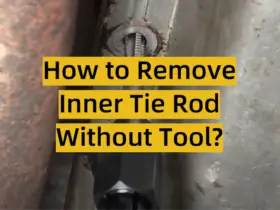In the fast-paced world of auto mechanics, there is a never-ending debate that has divided car enthusiasts and professionals alike: the distinction between lug nuts and lug bolts. Many have tried to settle this long-standing feud, but the murky waters of automotive jargon have left us questioning what truly separates these two seemingly similar components. This article is here to put an end to the confusion and bring clarity to the table. So, fasten your seatbelts and join this article on this thrilling ride as you will delve deep into the world of lug nuts and lug bolts, decoding each one’s unique qualities and revealing the answer to the age-old question – what’s the difference between them?
How to choose the right wheel nuts and bolts?
When it comes to choosing the right wheel nuts and bolts for your vehicle, you have two main options: lug nuts and lug bolts. Each one has its advantages and disadvantages, so it’s important to understand which is best suited for your particular needs. In this article, we’ll take a look at the differences between lug nuts and lug bolts, as well as how you can determine which is the best choice for your vehicle.

Lug nuts are typically made of steel and feature a tapered outer edge, which makes them easier to tighten by hand. They’re usually more durable than lug bolts, but they can be difficult to remove if over-tightened. Lug bolts, on the other hand, are typically made of aluminum or stainless steel and feature a flat outer edge for easier tightening with a wrench. They’re also more resistant to rust and corrosion, which makes them an ideal choice if you live in areas that experience lots of rain or snow.
When it comes to installation, lug nuts are usually easier to install since they don’t require any special tools. Lug bolts, on the other hand, require a specific socket set to tighten them properly. Both lug nuts and bolts are available in various sizes, so make sure you measure the wheel studs before purchasing either one. Additionally, be sure to check that your vehicle’s manufacturer-specified torque rating is correct for the size of wheel fastener you choose.
What is a Lug Nut?
A lug nut, also known as a wheel nut, is a specialized type of nut used to secure a wheel onto an axle. It plays a critical role in maintaining the integrity and safety of the wheel assembly. Lug nuts are typically made from durable materials such as steel, providing the necessary strength to withstand the forces exerted on the wheel during operation. However, they can also be constructed from other materials like aluminum, brass, or nylon, offering different advantages in terms of weight, corrosion resistance, and ease of installation.

Lug nuts come in various shapes and sizes, catering to the specific requirements of different wheel types and vehicle models. The choice of lug nut depends on factors such as the thread size, pitch, and seat type of the wheel being attached. Some common types of lug nuts include cone seat lug nuts, which feature a conical shape for secure fastening, tapered seat lug nuts, which have a tapered seat for improved centering, and radius seat lug nuts, which incorporate a curved seat for enhanced wheel contact.
Lug Nut Pros
Lug nuts, the tried-and-true fasteners used to securely attach wheels to a vehicle, have withstood the test of time for decades. Renowned for their simplicity of installation and cost-effectiveness when compared to lug bolts, they have emerged as a favored option for replacing lost or damaged wheel hardware. Furthermore, the versatility of lug nuts is truly remarkable, as they are available in a wide range of sizes and styles, ensuring that you can effortlessly find the perfect fit to meet your specific requirements.
Whether you are a devoted DIY enthusiast or a seasoned professional mechanic, the unparalleled reliability and widespread availability of lug nuts make them an indispensable and irreplaceable component for guaranteeing the utmost wheel security.
Lug Nut Cons
The main downside to lug nuts is that they can be quite challenging to remove, especially if the wheel has been left on the vehicle for an extended period. When parts rust and corrode together, it becomes even harder to break them apart without causing damage to either component. This can be a frustrating experience for car owners who are trying to replace a tire or perform maintenance on their vehicle.
Another issue with lug nuts is that they tend to come loose over time. This means that periodic tightening is necessary to ensure that they remain secure. While this is true for all-wheel fasteners, it can be particularly troublesome with lug nuts. It’s important for drivers to regularly check the tightness of their lug nuts to prevent any potential accidents or damage to the vehicle.
Furthermore, some vehicles may not accept conventional lug nuts due to their unique design or the limited space available in the wheel well. In such cases, car owners may need to opt for more expensive lug bolts instead. This can add to the overall cost of maintaining the vehicle and may require additional research and assistance to find the appropriate lug bolts for the specific vehicle model [1].

What is a Lug Bolt?
Lug bolts, also commonly referred to as wheel bolts, play a crucial role as fasteners that securely attach wheels to a vehicle’s hub. Typically crafted from durable steel, these bolts feature an externally threaded design accompanied by a hexagonal head for easy installation and removal. It’s worth noting that lug bolts come in various sizes, lengths, and thread pitches, catering to the specific requirements of different vehicle types. With their versatility and reliability, lug bolts ensure the proper functionality and safety of wheels on the road.
Lug Bolt Pros
One of the most significant advantages of lug bolts is that they offer increased resistance to vibration and loosening. This is because the threaded shaft provides additional grip strength, keeping wheels firmly in place at all times. Additionally, lug bolts also reduce the risk of damage to wheel studs since they don’t require a lot of force for installation or removal, preserving their integrity over time.
Furthermore, the design of lug bolts allows for optimal torque distribution, ensuring a secure and balanced connection between the wheel and the vehicle hub. This not only enhances overall stability and handling but also minimizes the chances of wheel wobbling or uneven wear. Moreover, the precision threading and durable materials used in lug bolts contribute to their longevity and reliability, making them a trusted choice for automotive enthusiasts and professionals alike.
In summary, the utilization of lug bolts provides a comprehensive solution for maintaining wheel security and performance. With their enhanced resistance to vibration, reduced risk of stud damage, superior torque distribution, and long-lasting construction, lug bolts offer peace of mind and confidence on the road.

Lug Bolt Cons
However, lug bolts can be quite expensive when compared to lug nuts. This is partly because they tend to require more time and effort for installation and removal, which can add up to the overall cost of service. Additionally, they’re also limited in terms of their application as certain types may not be compatible with some vehicles or wheels. For example, specific lug bolts may be designed for high-performance cars with unique wheel configurations, further contributing to their higher cost.
It’s important to consult with a professional mechanic before making any purchasing decisions to ensure that the chosen lug bolts are not only compatible but also optimized for your specific vehicle and driving needs. Taking this extra step can help you avoid unnecessary expenses and potential compatibility issues in the long run, ultimately ensuring a smooth and safe driving experience [3].
Lug Nut vs. Lug Bolt: What’s the Difference?
Are you considering fixing your car’s brakes but not sure what type of wheel fasteners to use? Lug nuts and lug bolts are the most common types of hardware used for securing wheels to a vehicle. But do you know which one is right for your application?
The key difference between lug nuts and lug bolts lies in their design. Lug bolts have a tapered cone shape, while lug nuts are typically flat on the bottom and have a rounded top. Lug bolts also feature threads that run around the outside of the shaft and extend to the head. Lug nuts don’t have threads, but instead feature holes or slots for attaching them to a wheel.

The choice between lug nuts and lug bolts depends on your vehicle’s make and model. Lug nuts are the most common choice for passenger cars, while lug bolts are used in heavier vehicles such as trucks and SUVs. Some vehicles may require a combination of both. It’s important to check with your car’s manual or manufacturer to determine which type is best for your specific needs.
When it comes to installation, both lug nuts and bolts are relatively easy to install. Lug nuts require a wrench or socket while lug bolts usually need a hex key or Allen wrench. Both should be tightened in a star pattern for optimal safety and performance.
It’s important to remember that when replacing wheel fasteners, you should always use the same type as was previously used. This will ensure that your wheels remain secure and safe on the road.
When it comes to buying wheel fasteners, you should always purchase ones made from high-grade metals such as steel or aluminum for maximum strength and durability. Make sure you buy the right size for your vehicle or else they won’t fit properly. Additionally, look for corrosion-resistant and rustproof types that can stand up to your car’s environment and regular wear and tear.
In the end, it’s important to choose the right wheel fastener for your vehicle. Lug nuts and lug bolts are both efficient ways of securing wheels to a car, but make sure you know which one is ideal for your application. Doing your research and following the manufacturer’s instructions will ensure a safe and secure ride for you and your passengers [4].

What is right for you? Lug Nut or Lug Bolt?
Deciding which fastener is right for you depends on a variety of factors, including the type of vehicle, wheel size and wheel style. Lug nuts are typically used on newer vehicles that have larger wheels and tires. Lug bolts are most often used with older vehicles or those with smaller wheels and tires. In some cases, a combination of both may be necessary depending on the specifications.
When considering the types of fasteners for your vehicle, it is important to understand the differences between lug nuts and lug bolts. Lug nuts are a traditional type of fastener used to secure wheels to a car or truck. The nut-like shape provides greater strength than that of a single bolt but also requires more torque when tightening and loosening.
Ultimately, it is important to select the fastener that is best suited for your vehicle and wheel size. Lug nuts offer greater strength while lug bolts provide convenience due to their easy removal and installation. If you are unsure which type of fastener would be best for your situation, consult with a professional or research online to determine what type of bolt or nut would be best for your individual needs.
No matter which type of fastener you choose, make sure that you always use the correct torque when tightening and loosening to ensure the safe operation of your vehicle. Improperly installed or torqued lug nuts or bolts can cause catastrophic damage to your wheels and tires, leading to a costly repair or replacement. It is also important to inspect the lug nuts or bolts regularly, as they can become loose due to vibration or wear and tear over time. Regular inspection of your fasteners will help ensure that your vehicle is safe and secure for a long time.

FAQ
What is the difference between a stud bolt and a lug bolt?
A stud bolt is a type of threaded fastener that consists of a head and a screw thread, while a lug bolt is a type of threaded fastener with an externally threaded shaft tapped internally to accept a nut or other compatible part. The head on the stud bolt is usually larger than the lug bolt so it can provide better grip strength when tightened. Additionally, stud bolts are designed to be used in combination with nuts, while lug bolts do not require the use of a nut. Lug Bolts can also have different head types such as hex or flanged heads.
What is a lug nut?
A lug nut, a common type of fastener, plays a crucial role in securely fastening the wheel onto the axle of a vehicle. It consists of an externally threaded shaft that is internally tapped to accept another compatible part. The head of a lug nut is typically hexagonal in shape and features projections on the sides. These projections aid in tightening the lug nut, ensuring a tight and secure fit. To fasten the lug nut, a wrench or socket is used, taking advantage of its flat underside design. Moreover, lug nuts are available in various sizes to accommodate different types of wheels and vehicles, providing a versatile solution for automotive needs.
What are the three types of lug nuts?
There are three main types of lug nuts used for securing wheels: standard, extended, and tuner. Standard lug nuts, being the most common type, are available in various sizes to accommodate different wheel designs. Extended lug nuts, on the other hand, feature an extended length that makes them suitable for thicker wheel rims or deeper lug bolt holes. Finally, tuner-style lug nuts are specifically designed to add a custom and eye-catching appearance to vehicle wheels. These tuner lug nuts often come in vibrant and flashy colors, allowing car enthusiasts to personalize their wheels according to their own unique style and preferences.
What is the purpose of lug nuts?
The purpose of lug nuts is to tightly fasten a wheel onto an axle while providing enough grip to keep it secure. Lug nuts are usually tightened with a wrench or socket and should always be used in conjunction with lug bolts for added strength and security. Additionally, using the correct size and type of lug nut for a particular wheel is important, as an improperly fitted lug nut can cause the wheel to become loose and potentially lead to dangerous road accidents. Furthermore, it is also important to check the tightness of the lug nuts on your wheels regularly to ensure that they are properly secured.
What is the most common size of lug nuts?
The most common size of lug nuts is 12×1.5mm, which is widely used for many Japanese and domestic vehicles. It is crucial to refer to your vehicle’s manual to ensure the correct size and type of lug nut for securely fastening your wheels. Taking this step guarantees optimal safety and performance.
Moreover, in addition to the 12×1.5mm size, other commonly used lug nut sizes include 14×1.25mm and 14×2.0mm. These sizes are specifically utilized for certain types of vehicles, catering to their unique wheel requirements. By understanding these variations, you can confidently select the appropriate lug nuts for your vehicle, ensuring a perfect fit and reliable wheel fastening.
What is the best way to tighten lug nuts?
The best way to tighten lug nuts is by using a torque wrench set to the recommended value indicated in your vehicle’s manual. It is important to ensure that all of the lug nuts are tightened evenly and with equal pressure, as this will help create a more secure fit and prevent the wheel from becoming loose. Additionally, use a star pattern when tightening the lug nuts to ensure an even distribution of torque over all the lug nuts.
Once the recommended torque is reached, double-check each lug nut for tightness. This will help ensure that none of them have been missed or left loose. Finally, it is important to inspect the condition of the lug nuts periodically to make sure they are still in good condition and securely fastened.
Are there any tips for replacing lug nuts?
When replacing lug nuts, it is important to employ proper safety measures such as wearing protective gloves and eyewear while handling them. Additionally, use a torque wrench to tighten the nuts and follow the recommended torque values indicated in your vehicle’s manual.
Furthermore, it is important to use a star pattern when tightening the lug nuts so that they are evenly distributed and there is no risk of imbalance due to an uneven distribution of torque. If necessary, make sure to lubricate the threads of the lug nuts before installation to allow for easy fitting and lower levels of friction. Finally, use a torque wrench to check the tightness of the lug nuts after installation and double-check them periodically for maintenance. By following these tips, you can guarantee that your wheels will remain safely fastened onto the axle and ensure optimal performance and safety.
Can I reuse lug nuts?
In most cases, it is not recommended to reuse lug nuts as this can compromise the safety and performance of your vehicle. It is important to use new lug nuts, as they can provide greater grip strength when tightened and ensure a tight fit between the wheel and axle. Additionally, it is also important to purchase the correct size and type of lug nut for your vehicle, as an improperly fitted lug nut could lead to dangerous road accidents due to wheels becoming loose or slipping off the axle. By using new lug nuts and taking the necessary safety precautions, you can guarantee a secure fit between your wheels and axle, providing optimal performance and protection while on the road.
Are lug bolts better than lug nuts?
Lug bolts and lug nuts both provide a secure fit between the wheel and axle, making them equally important components of your vehicle. Lug nuts are typically used in combination with lug bolts to ensure optimal safety and performance. However, some vehicles may only require one or the other depending on their design. Generally speaking, lug bolts have a greater clamping force than lug nuts since they are fitted in pairs and can also provide additional support when tightened. Therefore, they may be the better option for certain types of vehicles that require extra strength and security. Ultimately, it is important to refer to your vehicle’s manual to determine the appropriate type of lug fasteners for optimum performance and safety.
What is another name for lug nuts?
Lug nuts are also commonly referred to as wheel nuts, lug bolts, or wheel studs. They all refer to the same fastener and serve similar purposes – providing a secure fit between the wheel and axle. Therefore, they can be used interchangeably depending on your vehicle’s design and requirements.
It is important to note that when purchasing lug nuts of any sort, it is essential to use the correct size and type of fastener. This will guarantee a secure fit between the wheel and axle, providing optimal performance and safety on the road. Additionally, make sure to follow your vehicle’s manual for recommended torque values when tightening lug nuts or bolts to ensure that they are securely fastened. With proper installation and regular maintenance, you can guarantee a safe and comfortable ride every time.
Useful Video: Wheel Bolts VS Wheel Studs and Lug Nuts
Conclusion Paragraph
Lug nuts and lug bolts are both essential components for any wheeled vehicle. Lug nuts are typically used on steel wheels and lug bolts are more commonly found on aluminum wheels. Deciding which one to use when building a vehicle will often come down to personal preference, but in some cases, the type of wheel being mounted might dictate which one is best suited. Ultimately, both lug nuts and lug bolts have their pros and cons, but they both serve the same purpose: to keep a wheel securely mounted. Ultimately, it’s up to you which one to use for your particular application. Whatever you choose, make sure that it is properly tightened and regularly inspected to ensure maximum safety and performance.
References
- https://www.linkedin.com/pulse/how-choose-right-car-lug-nuts-wheel-locks-anton-zuo
- https://www.lesschwab.com/article/wheels/lug-nuts-torque.html
- https://www.wikimotors.org/what-is-a-lug-bolt.htm
- https://blog.thepipingmart.com/fasteners/lug-bolt-vs-lug-nut-whats-the-difference/













Leave a Reply